Palm oil and Palm Kernel business in South East (1)

Business and Economy reporting
Twin oils from Palm trees and rediscovering South-East lost economic glory
By Odogwu Emeka Odogwu
In early days of Nigeria, oil palm tree was one of the mainstays of the country’s economy. Eastern Nigeria region was one of the biggest exporters of palm produce. But, unfortunately, not too long after the discovery of crude oil in Niger Delta region, the huge palm produce economy of the area vanished.
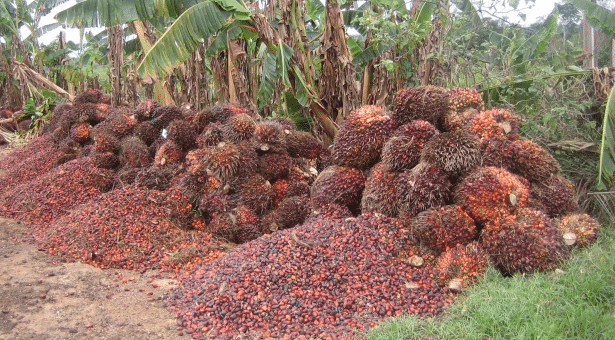
There is a renewed zeal for palm oil economy in the South East; Odogwu Emeka Odogwu in this report observes a gradual resurgence of the industry in some states of the South East, Nigeria.
He reports that there is more to palm tree than trade and commerce. It is as much a vital agricultural factor as it is a core player in global economic, politics and industrialization.
In some countries of dub-Sahara Africa such as Nigeria as well as those of South East Asia, the highly lucrative cash crop stirs political changes and determines the pulsation of export trade.
Palm oil and palm kernel oil have assumed international politics in some climes as Malaysia’s biggest palm oil conference was postponed to June because of health and safety concerns of cases of coronavirus hitting China and pockets of some parts of the world.
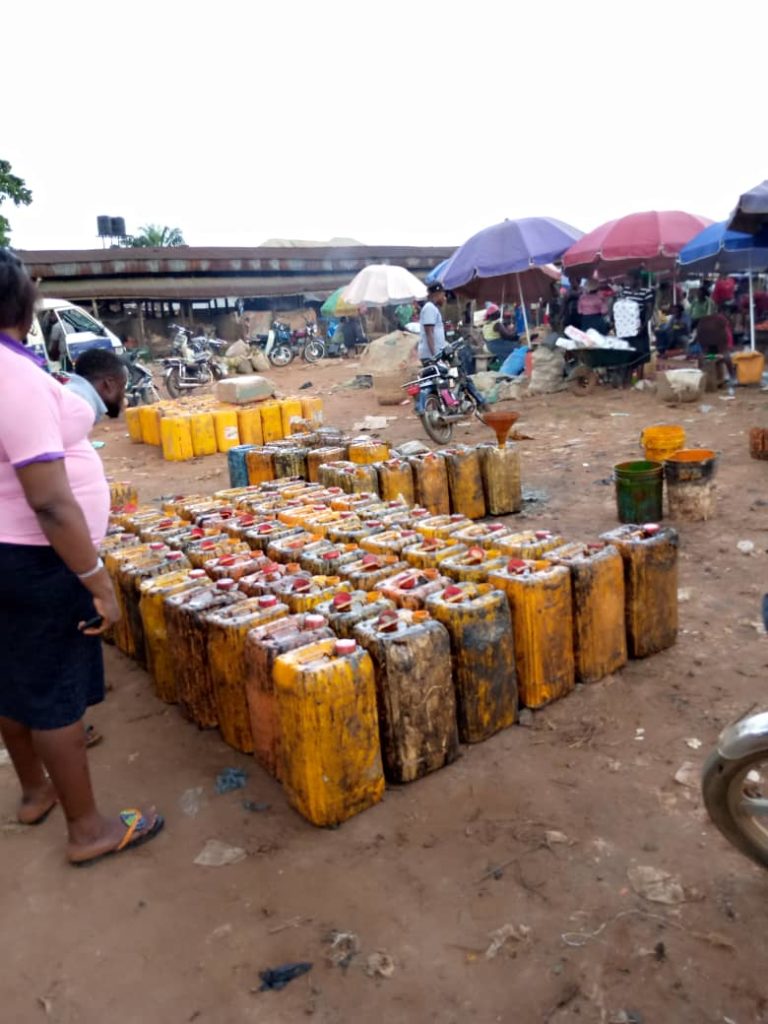
The conference organizers Bursa Malaysia Derivatives said the Palm and Lauric Oils Price Outlook Conference and Exhibition, or POC2020, will be rescheduled to June 22 to 24, from its original dates of March 2 to 4, as according to them, “The safety and health of all those involved in a primary concern”.
This conference is one of most highly anticipated in South-east Asia, drawing more than 2,000 participants, and has been on yearly in the past 30 years. What does this signify about palm trees that we aren’t giving enough attention despite its twin value in palm oil and palm kernel oil?
Diplomatic crisis is already brewing between India and Malaysia and the victim is palm oil. India, the South Asian country is the world’s biggest palm buyer and major market for Malaysia. Malaysia is the No 2 producer of palm oil and oil is its economic soul. Every loss leaves a big blow to its economy. India restricted imports of refined palm oils this February maybe and maybe not because of statement by Malaysian Premier Mahathir Mohamad’s comments on steps taken by the administration of Indian Prime Minister Narendra Modi that affect Muslims in India.
According to Khor Yu Leng, an independent economist with Segi Enam Advisors, who has published papers on Malaysia’s political economy, if India’s refined imports from the nation drops from about 2.6 million tonnes a year to reach to 2018 levels, about two million tonnes of Malaysian processed products worth US$1.4 billion may need new buyers. Look at that!
Indian government has informally told local importers to avoid purchasing crude palm oil from Malaysia, according to traders and industry officials, who asked not to be identified due to the sensitivity of the matter. They are shifting to Indonesia, Businesstimes.com.sg reveals. There is drop in official January data to 12.7 per cent to 1.76 million tonnes from the previous month.
“If India doesn’t buy from Malaysia, the country has to find other buyers,” said Oscar Tjakra, analyst at Rabobank International in Singapore. “Malaysia may have to change its export duties to remain attractive.”
This is why Nigeria should wake up now and take the bulls by the horns in championing palm oil and palm kernel business as the boom becomes. South East Governors and entrepreneurs should lead this mission to reposition South East economically.
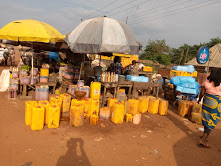
Agro business has huge investment opportunities because agriculture remains the largest sector of the economy, generating employment for about 70% of the Nigerian population. It contributes 40% to the GDP with crops accounting for 80%, livestock 13%, forestry 3%, fishery 4%.
With Nigeria’s reverse from oil to non-oil sector for its economy, agriculture would gain prominence sequel to the role it played in the pre-colonial and post-colonial era. Agriculture has the capacity to scale and generate enough wealth for the country.
The five states in South-East including Abia, Anambra, Imo , Ebonyi and Enugu are palm oil producing states, just like almost all the states in South-South and South West. Research showed that about 80percent of edible oil in Nigeria come from refined palm kernel oil. It is lucrative to deal in palm kernel oil both locally and internationally with profit margins of between 15% and 110%.In agriculture, agribusiness includes everything in agricultural production like crop production, processing, agrichemicals, breeding, distribution, farm machinery, and seed supply, to marketing and retail sales Stan Edom, the founder of StartupTipsDaily Media, and the founder of Globexia Limited. It is all encompassing.
There have been calls for oil palm business to be in the front burner, but that has yielded no positive action because the business has been relegated to the hands of the local farmers who have little or no resources to embark on a large scale production
The resultant effect is that the production of palm oil and palm kernel oil in the country is so poor that it cannot even serve the teeming population of consumers across the country.
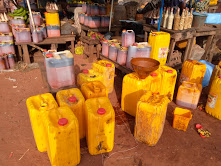
Nsukka Palm Oil Market
The UN’s Food and Agriculture Organization operates a section devoted to Agribusiness Development which seeks to promote food industry growth in developing nations.
In Nigeria, palm trees are everywhere but it was the South East that made it a business line before, during and after the colonial rule. That was why in 60’s, palm trees became the source of revenue for the Eastern region through the sale of palm oil.
Palm trees are in the family of Arecaceae ,a botanical family of perennial lianas, shrubs, and trees. And we have different types of palm trees depending on climate and other environmental factors.
It was a beehive of activities in almost all the mills, palm oil markets and palm kernel markets visited in some parts of South East over a period of time.
Anambra state
Every community in Anambra state is into oil processing no matter the scale. The markets too have sections for selling palm oil products. But I visited some of the mills. One of the mills at Nise, Awka South local government area at Ngene Awka was empty when I visited as I met nobody in the mill. I was told they have finished the business of the day before my arrival. That was true as the next time, I was going to Igboukwu via the road, the mill was filled to the brim.
From Umunze in Orumba South to Igboukwu in Aguata to Ojoto and Umuoji in Idemmili South to Nise in Awka South among other communities across the state there are palm oil millers and palm kernel cracking machines of different ranges. In some are outdated and obsolete machines and in some modern but not sophisticated as well as few adapted machines that could pass for hi-tech but it isn’t.
I experienced women and youths passing through minimal drudgery compared to what they pass through before these machines. They complained of heart ache and pains after the manual compressing to squeeze out the oil after crushing the palm nuts with palm oil mash separated from the palm kernels.
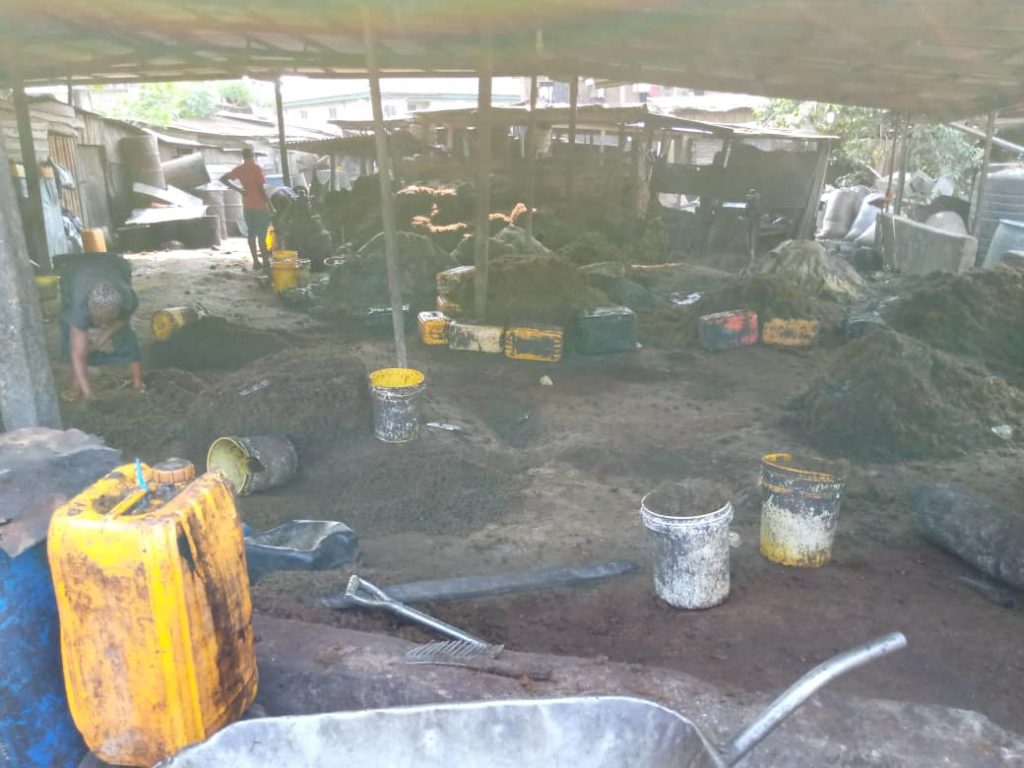
Igboukwu appears to be the largest market for oil in Anambra state as most retailers I asked where they source their oil for retailing mentioned Igboukwu but I later realized why it was so. They sell cheaper than other markets. The oil traders in Igboukwu sale a 25 litres N9,000 whereas other markets and millers sell between N6,500 and N8,500 for 20 litres of palm oil, depending on the type of oil processed.
Ojoto oil mill: Mgbeafuluike’s ready to beat Malaysia in palm oil business
My day was made when I arrived Ojoto in Idemmili South and saw two middle aged men, graduates, and brothers too. Dubem Mgbeafuluike and Amaoge Mgbeafuluike slugging it out in their N5Million oil palm factory known as Igwe Akwu Ojoto located at Ire Village. Dubem, a graduate of Economics from ESUTH in year 2000, served in Port Harcourt in 2002 at Baptist High School, Borokiri.
And his brother Amaoge, a graduate of Business Administration at Federal Polytechnic, Oko , 2004, served in Lagos after which he travelled abroad to China, later to Malaysia and Tokyo among others before returning home to ply the palm oil trade. They believed they would be billionaires from the oil business having seen it all in life and realized that agriculture is the place to be. Their rich uncles and relatives have been pestering them to abandon the business to come to Lagos and other places for a white collar job even Blue collar job, but their desire is for their relatives to assist them land grants from government and soft loans to expand the business. That is what they desired most now.
They are already Millionaires, but in assets, not in cash, hence they needed a break through from government to challenge Malaysia palm oil production. They can do it. But is government listening? The amazing thing again is that they manufacture their machines themselves after years of repairing the one their mother started the mill with. They have expanded the business with machines worth N500,000 in two places and other machines, assisting devices and equipment. It was amazing listening to the duo.
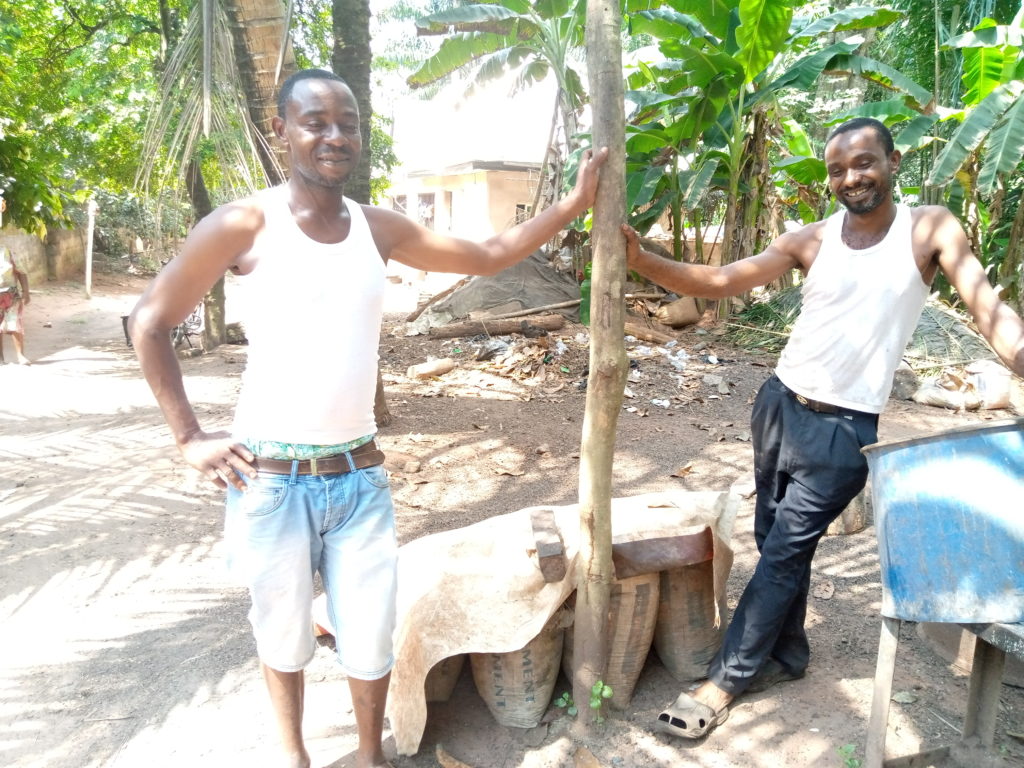
Mr Dubem Mgbeafuluike , Managing Director Igwe Akwu Ojoto right and his brother , Mr Amoge Mgbeafuluike , Deputy Managing Director Igwe Akwu Ojoto left standing in front of their palm oil mill in Ojoto.
According to Dubem, other youths are not aware of the multi million naira fallow money in the business simply because the business is seasonal. This isn’t the season. He employs people he continued to pay in and out of season but they become bored and engage in some other menial jobs to ameliorate boredom and through that may lose interest. He had two staff he pays N15,000 monthly but same fate happened to them recently. He has no workers for now but family members.
Dubem was a teacher after Youth Service for sometime before her mother established an oil milling machine. He quitted his job and joined his mother especially when a lot was on his head trying to run him mad. He needed to explode and place Ojoto on the map with the Palm oil and palm kernel processing mills but financial incapability slowed him down especially when the banks are not forthcoming with loans without C of O of his landed property. His land is ancestral land without a C of O. He has no N200,000 to process a C of O. If he has he would invest it back to the business to serve the needs of the masses. He wants machinery that will not only separate the oil from the palm kernel but compress the palm oil mash to bring out the oil, that’s a complete machine for palm oil processing.
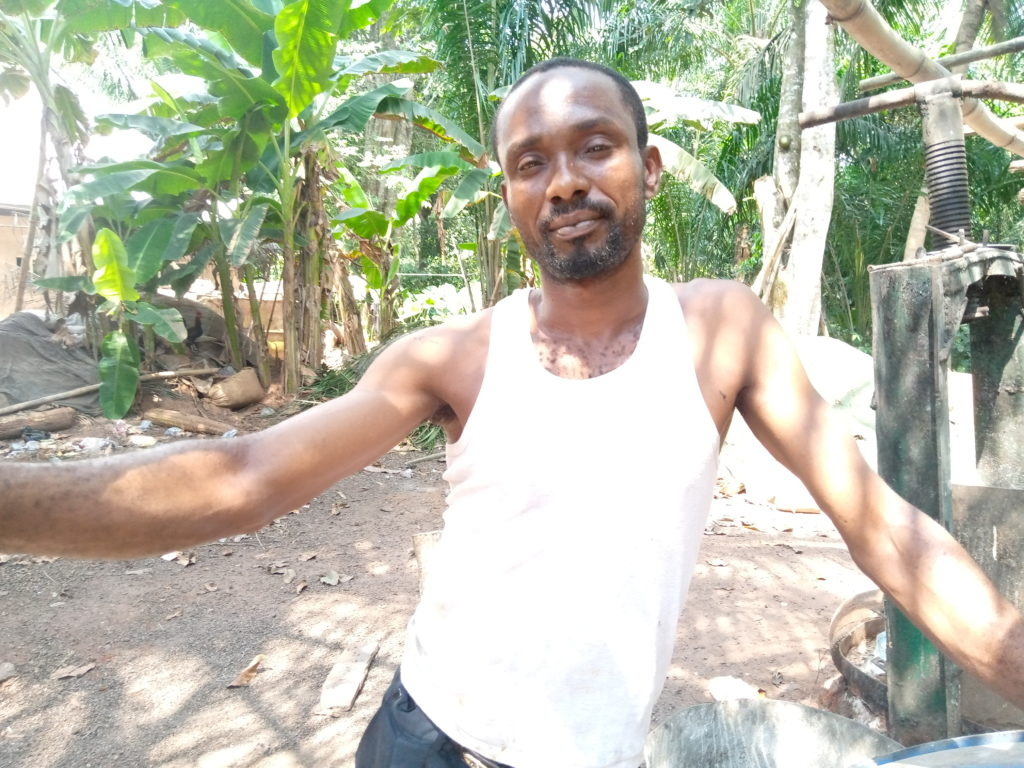
Mr Dubem Mgbeafuluike , Managing Director Igwe Akwu Ojoto standing in front of his palm oil mill in Ojoto.
The compressor machines he already has, he said costs N90,000 each, and N26,000 if for the Jack which is capable of lifting a trailer with 600 loads of cement , that’s 30 tonnes. The compressors he said are still operated manually which is time consuming and hectic most times. ‘’The machine I am looking at is Hi-Tech equipment Mill that can crush tonnes of palm oil and palm kernel without qualms, crush them and separate everything with minimal human supervision’’, he revealed.
‘’After so many times of disappointment by our welders whenever our machines spoil. We gradually learnt how to do some of the things ourselves, my brother too knows how to weld, until the welder advised us to buy wielding machine which we bought and experimented constructing the machine of our choice and by the grace of God we got the best of machines around here, though still obsolete o what I wanted but haven’t seen the type I wanted to adapt. I know it exists, still searching to see it in operation not in graphics and drawings.
‘’ What we need now is a loan or grant from the government. I am not interested in buying anybody’s machine because we will construct the machinery we need here with specifications. I am planning to embark on massive duplication of the machine we manufactured for other oil palm mills because we have seen that the difference is clear.
‘’It is now a family business but we are ready to embark on commercial if the resources are available because already we have equipment worth over N5 Million and if we have a grant of N10 Million, we would overtake Malaysia in oil business. We have the secrete and with N10 Million , we shall go international. We can compete with anyone around the world and surpass Malaysia.
‘’Some people truly came to invest in our mill but with conditions not peculiar in the oil processing industry. The investors would be expecting return on investment but palm oil business isn’t like that. It’s profits comes gradually in drops but they won’t have such patience and problem may develop to scatter a healthy relationship, so I said no to such proposals.
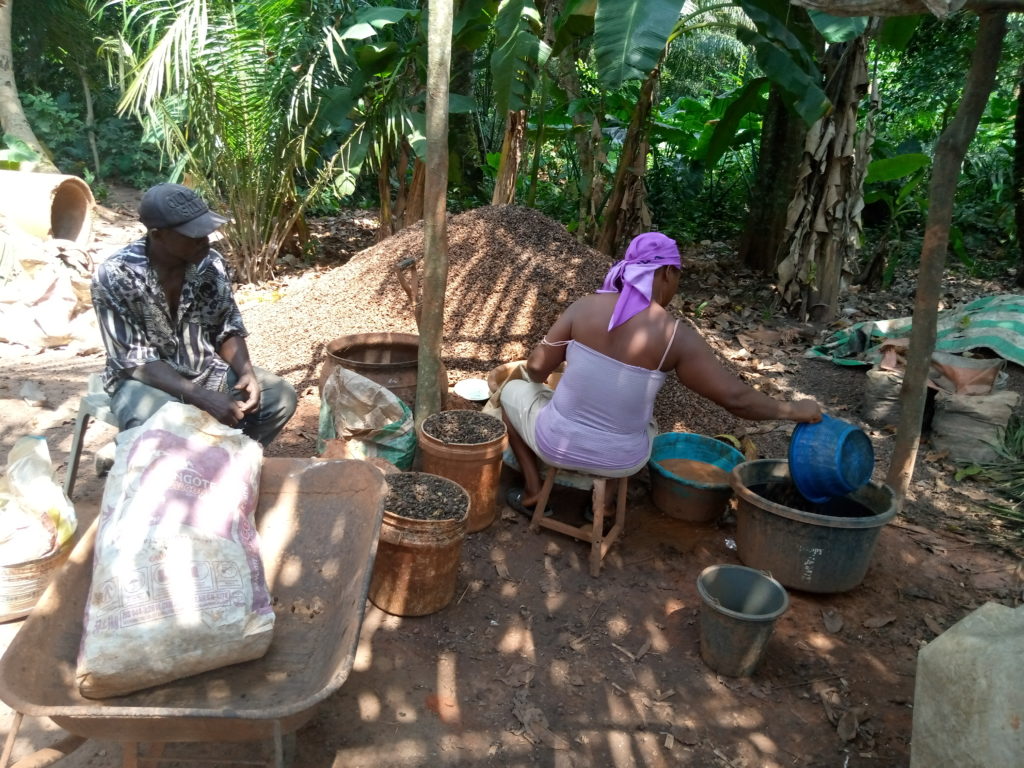
A worker washing palm kernel at Igwe Akwu Ojoto after breaking it as her friend watches
‘’I am maintaining my vision that the business would make me a Billionaire sooner than anyone could imagine. In the real sense of it, I am a millionaire in assets, but in real liquid cash I am a poor man. I don’t have up to N10,000 in my bank account. He has a funny notion that ‘poor people should not marry’, when asked reason, he said ‘ he ‘sees women as a recreation material’.
For Amaoge Mgbeafuluike, their deep interest in the business made people in the community proud of their commitment and dedication and as he was saying that, some of the customers were busy hailing him and his brother , calling them pet names for their ingenuity.
He returned from abroad and joined the business having seen that agriculture is the way to go. They want the government at all levels to support the palm oil and palm kernel business since the south east zone have comparative advantage in Oil palm and palm kernel production even palm wine production.
Nothing is a waste in this our palm nut business as the water is used in a plantain plantation in the large compound and along the roads to the oil mill. They own an electric wielding machine and Gas wielding machine. There are over 5 oil palm mills in Ojoto but I couldn’t visit others.
Nise Mill Ngene-Awka Awka South
At Nise in Awka South local government area, there were about three mills but the one I visited along the busy Amawbia-Nise-Agulu-Ekwulobia road at Ngene Awka market was empty. There was nobody in the compound when I arrived. The number at the wall was not connecting after several trials. Never the less, I entered the mill to discover it was built and donated by Mother Theresa Egbutu Foundation Nise to the Nise women. I was told by nearby women that the miller just left, as they have finished for the business of the day.
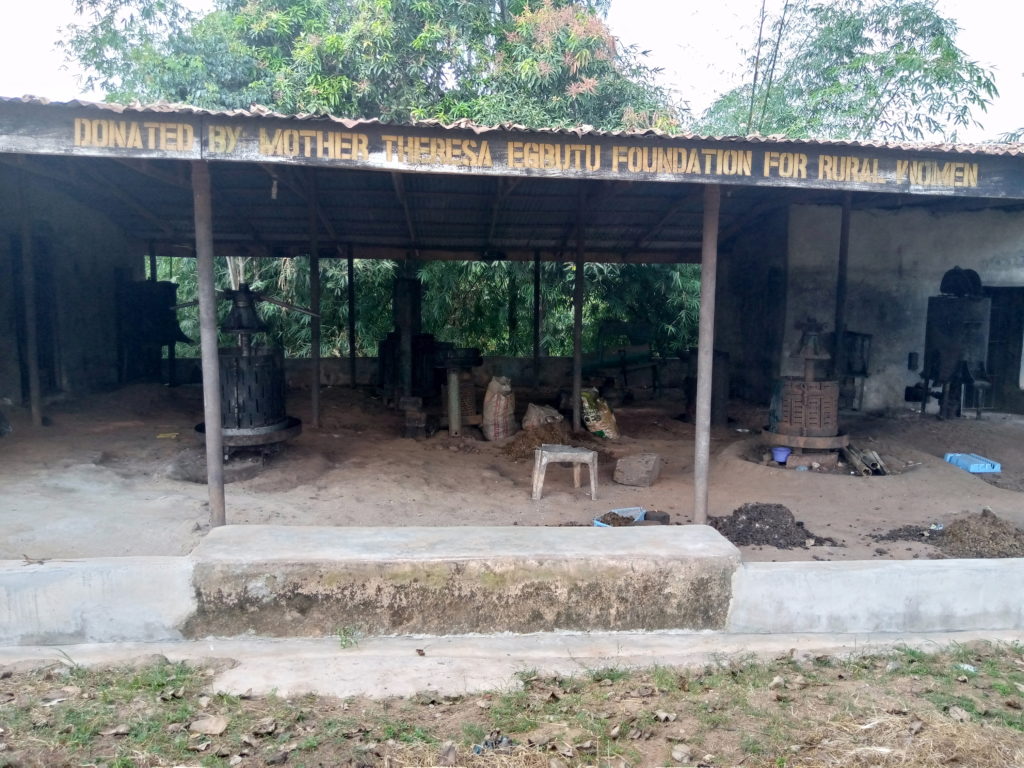
Confirming that, Mrs Augustina Ezeatu and Mrs Benedetti Ejie, said the mill was donated to the entire women by Egbutu’s. They confirmed that the machine donated has bought another machine and a palm kernel cracking machine.
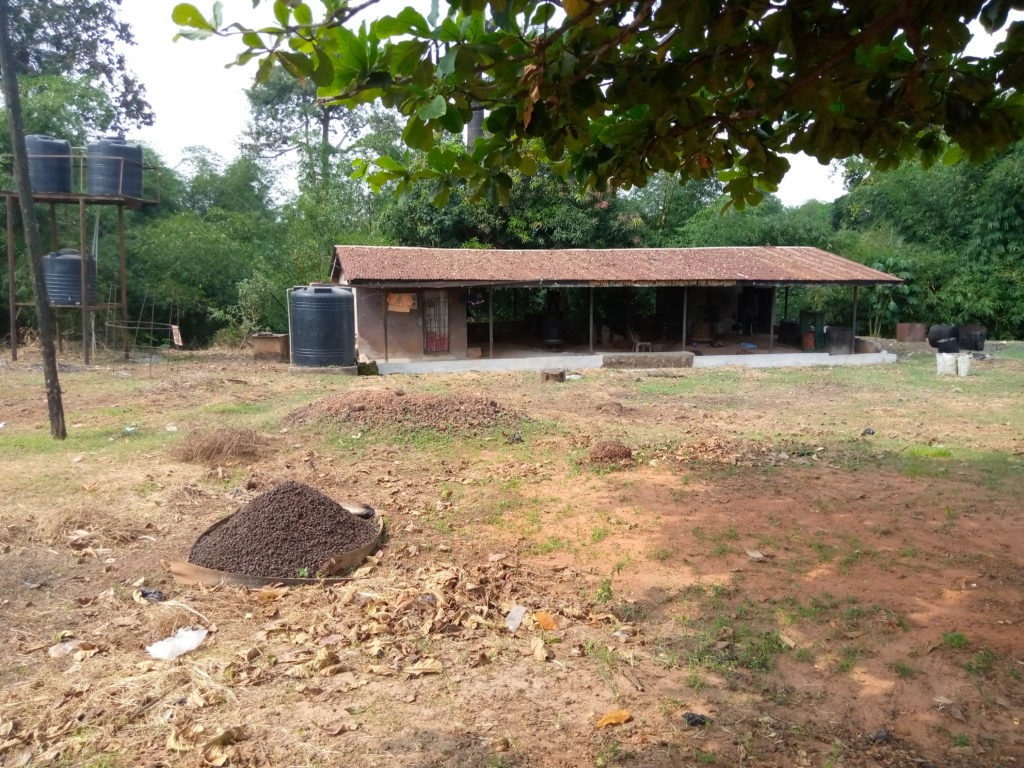
Mother Theresa Egbutu Foundation for rural women palm oil mill Nise
Mrs Ezeatu and Mrs Ejie said the women formed a cooperative society to take care of it because without that the machine would not be maintained. They said a cement bag is crushed for N300 each and you come with your firewood. There is a borehole. But in a situation, you don’t want your hands to touch the palm oil processing, there are people to do it for you at no cost, but you have to abandon your palm kernel and mash after first crushing to squeeze out oil for them at no cost. You only leave with your oil. They maintained that there is profit in the business but wouldn’t know how to present the profit margin. They sell 20 litres for N10,000 whereas Igboukwu sells 25 litres for N9,000.
Palm oil mill at Umuoji community
At Umuoji community, precisely Urumkpu village, the palm oil miller had finished crushing the palm oil and went over to the palm kernel when I arrived the village. I went to the palm kernel cracking section and I saw the husband, Mr CY Atanmuo and wife, Oluchukwu Atanmuo busy with that.
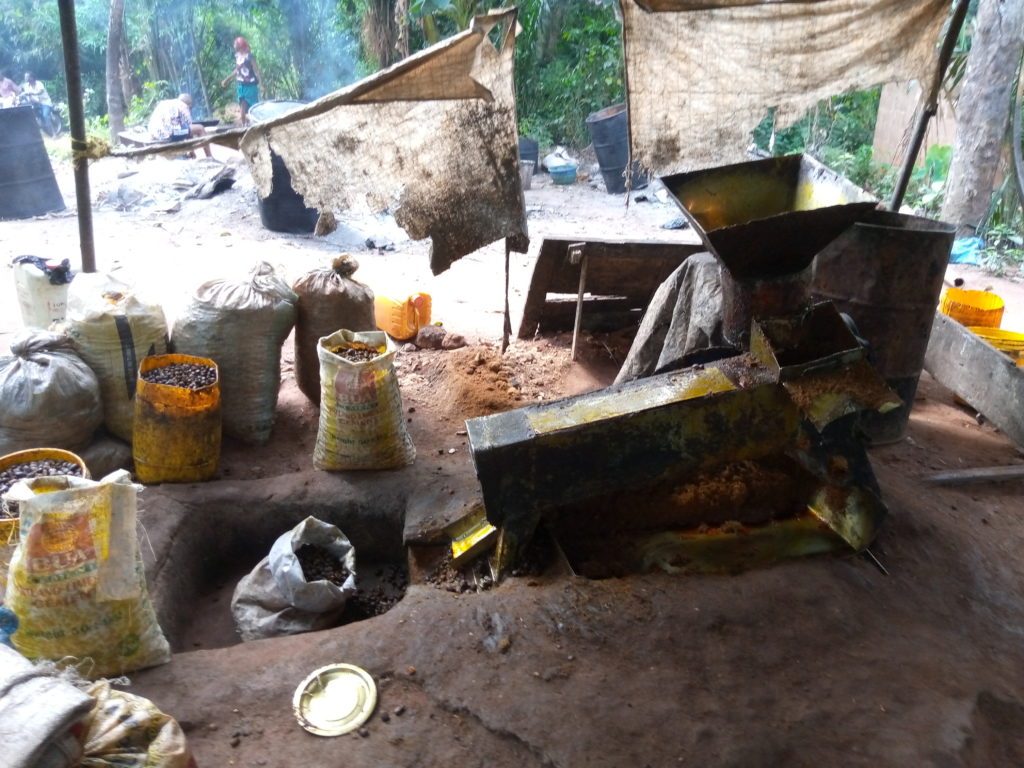
She managed to answer some of my questions. She has been in the business for 10 years and God has been faithful as there are projects to see for her hard labour. The millers have no association in Umuoji. Her major problem is where to buy palm kernel to crack for sale. She needs that more than anything else. Her clients are troubling her for more tonnes. It costs N100 to crack one cement bag, but a painter of cracked palm kernel sells for N350 and a bag is 8 painters.
Mr Atanmuo when approached confirmed that her wife owns the business and he was just supporting her whenever there was no job in his Alumaco business. He hopes government can intervene in the business and organize it in Anambra and South East to tap from the multi-million dollar. He says the crushing machine in his mill could be gotten with N350,000 and above while the Palm kernel cracking/breaking machine could be bought for N100,000 and above.
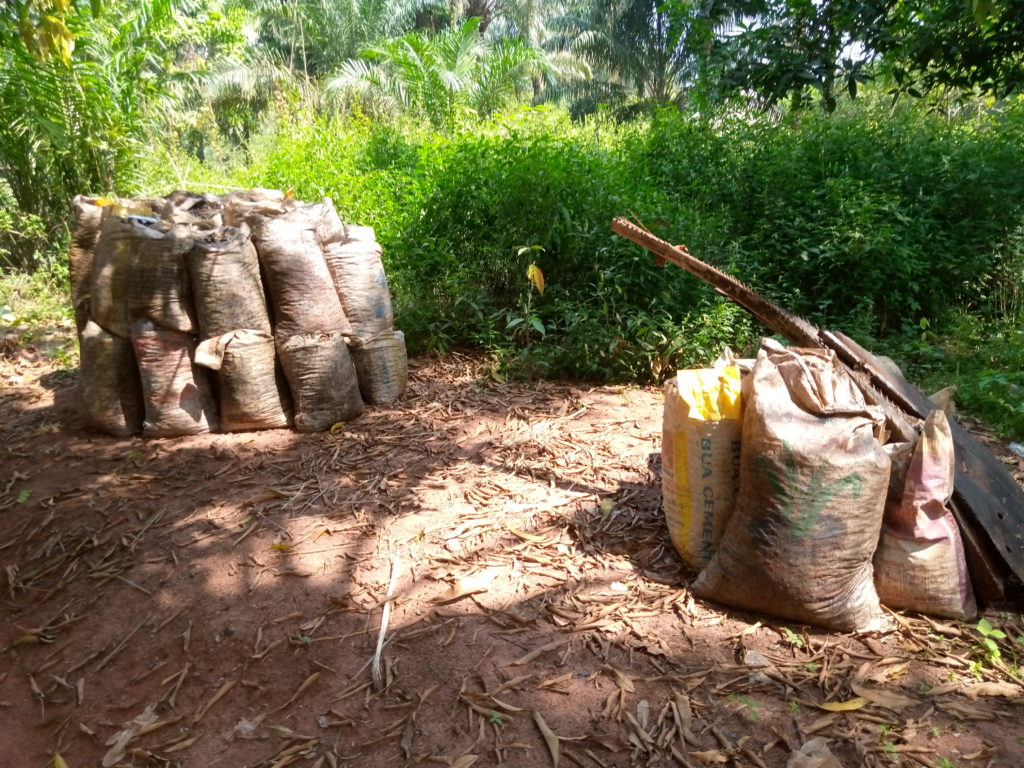
Bags of palm nuts waiting for processing at Urumkpu C.Y Atanmuo Umuoji palm oil and palm kernel processing mill
For Mrs Nneka Gabriel Egesimba , Mrs Francisca Okonkwo and Mrs Chizoba Okoye who were processing their oil at Atanmuo’s mill told me others have gone by 11 am, I arrived. They said the palm oil machine is about 10 in Umuoji as a community even bigger ones than where I met them. They told me that a drum of palm nut is crushed for N800 and the number of drums depended on the strength of the person who would squeeze oil out from the mash after crushing, hence between one and two drums are ideal a day for one to complete the task and rest. A drum of palm nut gives you 20 litres of palm oil and sometimes plus a 10 litres and sometimes 2 of 20 litres depending on the type of palm nuts crushed.
They informed that the machine using Jack to compress the oil does better than the one they were using at Igwe Atanmuo. They sell at Eke Umuoji. After crushing and squeezing the oil out, its remains should be fried and further squeezed for more oil. They said it was herculean crushing the mash to squeeze out oil, hence government should look inwards and make the business lucrative since Ndigbo have advantage in the palm trees. They want government to give them soft loan to ensure palm oil is readily available and they are ready to pay as at when due.
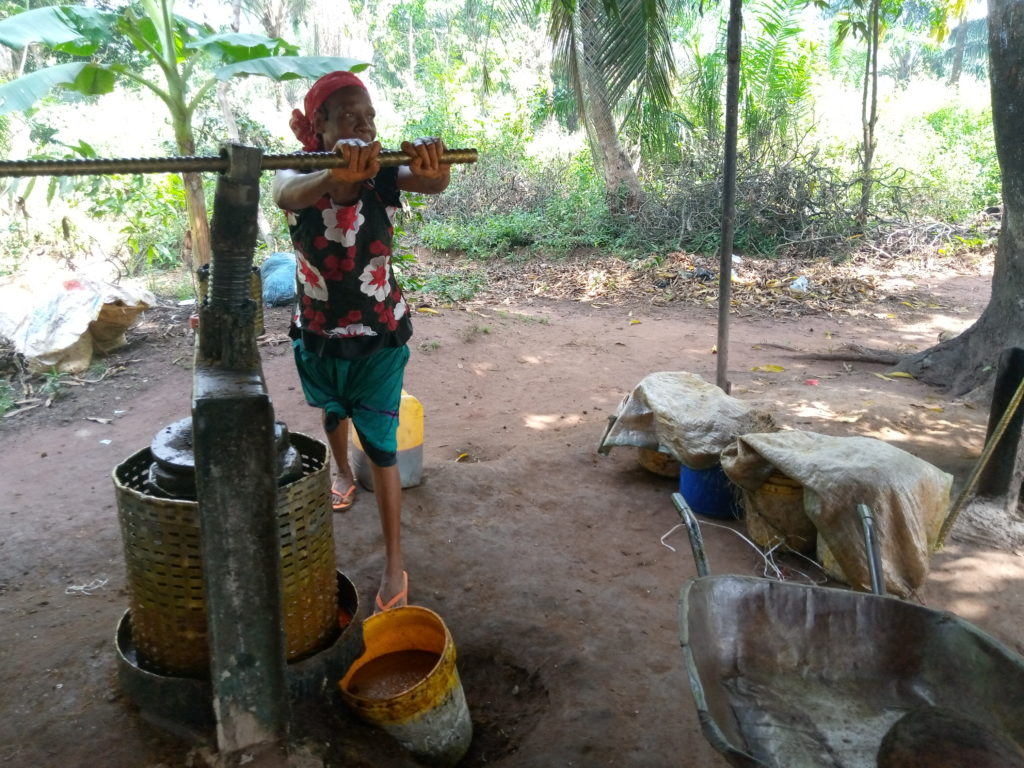
Chizoba Okoye busy with drilling out her palm oil
They said they can do 40 drums a day with modern machine, but that they couldn’t do without support financially since it requires money. They admitted there is much stress , pains in the heart region among other areas after pushing the compressor and if there is modern compressor, they can do 50 drums. They sale 20 litres between N8,000 and N8,300 but the 25 litres for between N11,000 to N13,000. The machine crushes palm nuts for not less than 15 different individuals daily. The sellers admit there is no much gain after the stress.
Mrs Oluchi Atamuo said out of inspiration to make palm oil extraction easier for rural women, she consulted a welder who constructed the machine for her. The mill she claims, produces over forty jerry cans of 25 litres of palm oil each day. She charges eight hundred naira to process one drum of palm fruits brought to her mill.
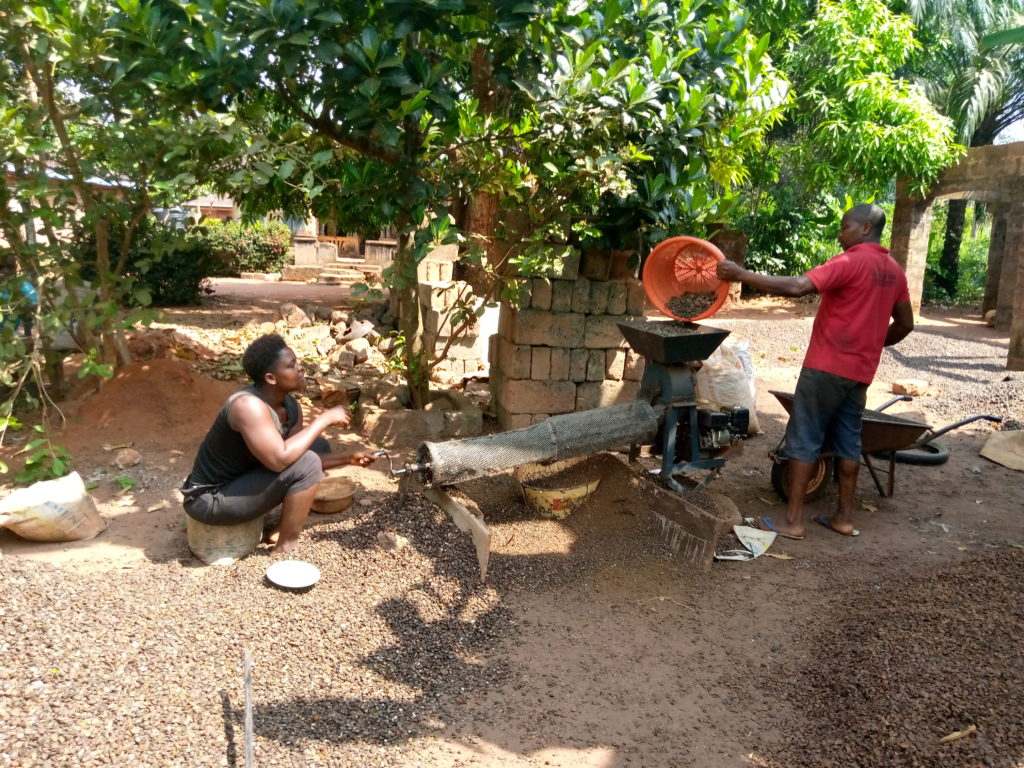
Uli and Ihiala axis palm oil mill Palm oil dealers have associations and at Uli and Ihiala Anambra state some of the traders comprising Anambra/Imo Produce Association use the Benson Umeh’s semi-mechanised palm oil milling machine located at Ihiala. The oil beach at Uli is no longer as active as it used to be but there are mills and oil business is still on in the community. It’s thriving and people come from far and near to patronize them and other milling machines in the area. The story isn’t same today because of smuggling and sabotage to the extent that people mix chemicals for sale in the name of red oil or kernel oil and our people patronize them because it is cheaper rather than natural oil processed in Nigeria.
……to be continued.



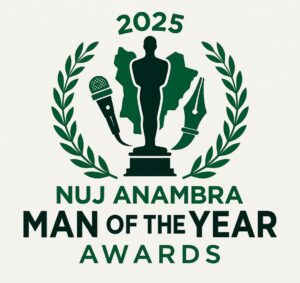






Why do we have the bank of Industry in Nigeria, what is wrong with the leaders in the South East, something needs to be done about this, Palm Oil can become a major source of Livelihood for our people. We cant wait for things to be better we need to make it happen by ourselves.
exactly
vvf
Its as if you had a great grasp on the subject matter, but you forgot to include your readers. Perhaps you should think about this from more than one angle.
Took me time to understand all of the comments, but I seriously enjoyed the write-up. It proved being really helpful to me and Im positive to all of the commenters right here! Its constantly nice when you can not only be informed, but also entertained! I am certain you had enjoyable writing this write-up.
This article gives the light in which we can observe the reality. This is very nice one and gives indepth information. Thanks for this nice article.
I have read your article; it is very informative and helpful for me. I admire the valuable information you offer in your articles. Thanks for posting it.
This is just the information I am finding everywhere. Thanks for your blog, I just subscribe your blog. This is a nice blog..
Good web site! I really love how it is simple on my eyes and the data are well written. I’m wondering how I might be notified when a new post has been made. I’ve subscribed to your RSS which must do the trick! Have a great day!
I really appreciate this post. I have been looking everywhere for this! Thank goodness I found it on Bing. You’ve made my day! Thank you again!
It’s really a nice and helpful piece of info. I am satisfied that you shared this helpful information with us. Please keep us up to date like this. Thank you for sharing.
you’ve an excellent weblog here! would you prefer to make some invite posts on my blog?
Great post. I was checking constantly this blog and I am impressed! Very helpful information particularly the last part 🙂 I care for such info much. I was looking for this certain info for a very long time. Thank you and good luck.